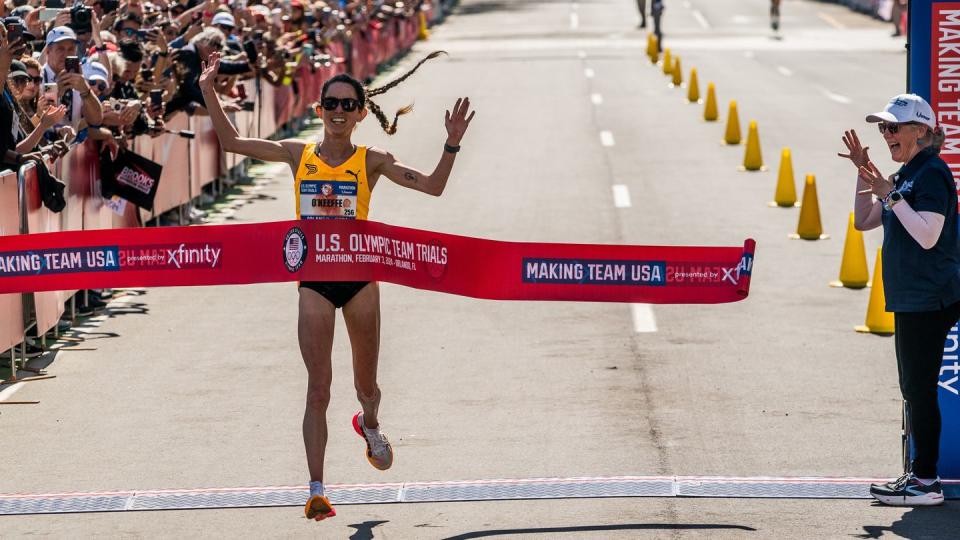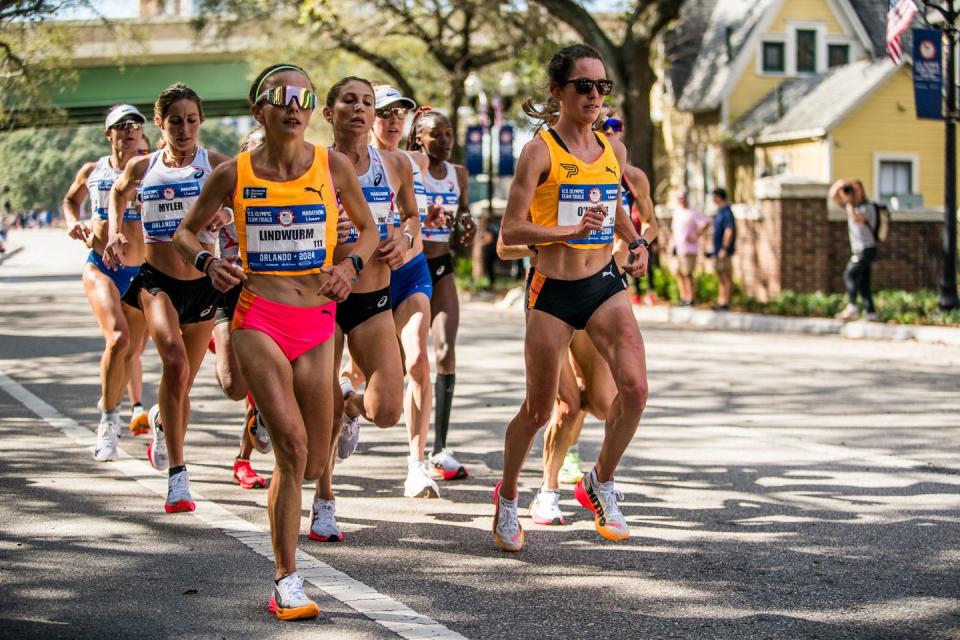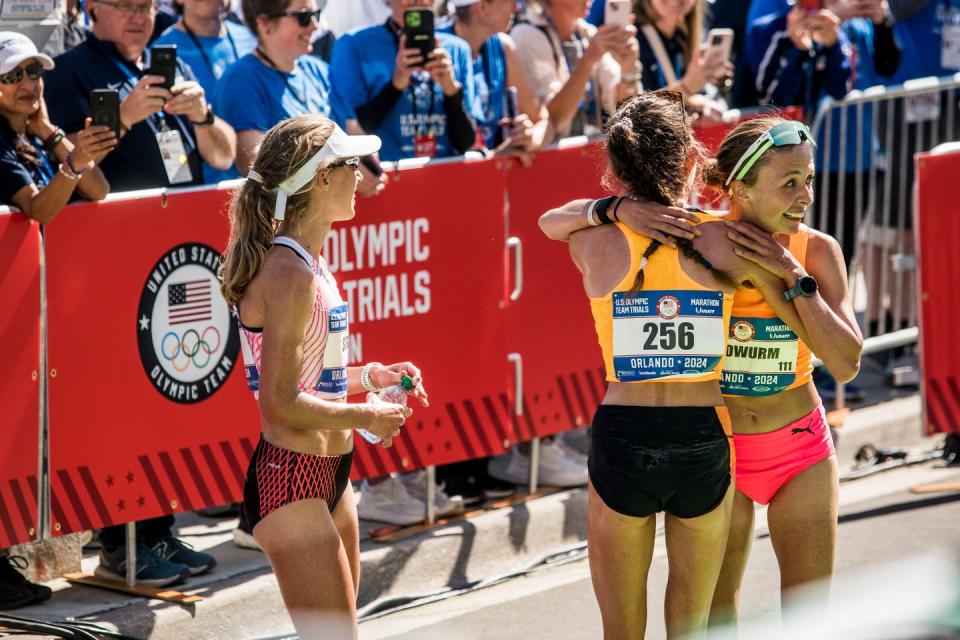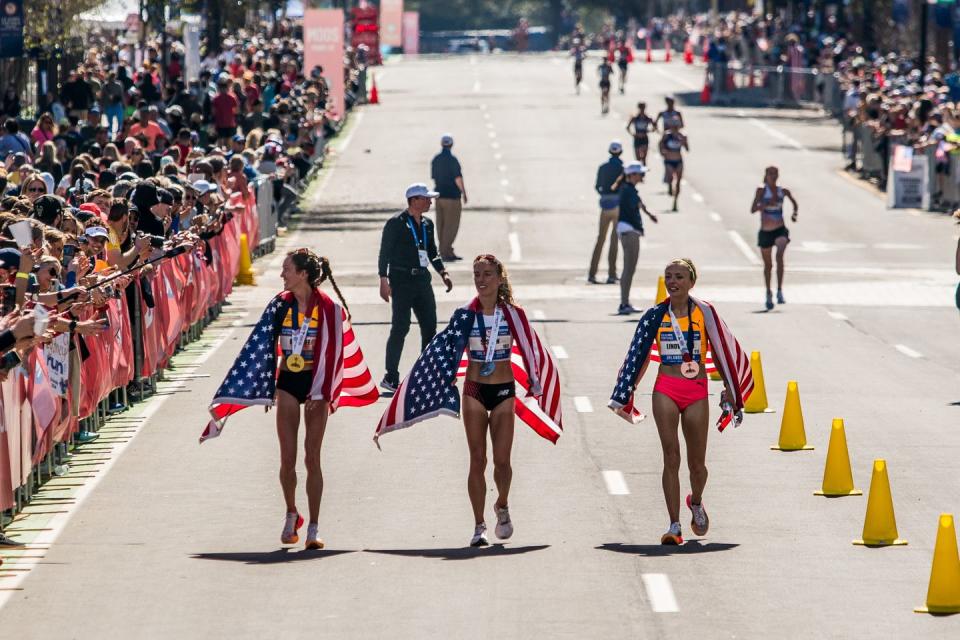In Her 26.2 Debut, Fiona O’Keeffe Sets Record To Win U.S. Olympic Marathon Trials

Fiona O'Keeffe won the Olympic Marathon Trials with a time of 2:22:10.
Emily Sisson, the American record holder in the marathon, finished second, at 2:22:42.
Dakotah Lindwurm came in third with a race time of 2:25:31.
In a stunning debut marathon, Fiona O’Keeffe of the Puma Elite Running Team in North Carolina won the Olympic Marathon Trials in 2:22:10.
Emily Sisson, the American record holder in the marathon, was second in 2:22:42, and Dakotah Lindwurm was third in 2:25:31 in a close-fought battle over the final miles.
O’Keeffe, Sisson, and Lindwurm will represent Team USA at the 2024 Paris Olympics in August. All three dipped under the previous Olympic Trials record, 2:25:38, set by Shalane Flanagan in 2012.
Despite the heat in Orlando—the race time temperature was 61 at the start, not ideal for fast marathon times—the race went out hard. Keira D’Amato led the pack through the first mile in 5:32; then the pace quickened to 5:17 for the second, which put the women on 2:21 pace.
By the fifth mile, only 14 women were with the lead group, which had all the favorites, including O’Keeffe and teammate Natosha Rogers, also in her debut marathon, and Caroline Rotich, 39, the 2015 Boston Marathon champion, who became a U.S. citizen in October 2023.

After hot early miles, the pace returned to a more reasonable 5:24 to 5:34 pace. The pack hit halfway in 1:11:43 (2:23 pace). One by one, women dropped off the back—Rogers, and then, more surprising, D’Amato, who held the American record for several months in 2022, after she ran 2:19:12 in Houston.
O'Keeffe made a big move between miles 18 and 19.
By 18 miles, the pack was down to five: O’Keeffe, Sisson, Sara Hall, Betsy Saina, and Emily Durgin, with several others, including Lindwurm, trailing by 8 seconds. Between 18 and 19, O’Keeffe made her move, opening up a 5-second lead with a 5:22 mile.
It was a gutsy decision to make, given her inexperience in the event and the credentials of the women in the pack. How did she know when to move?
“It felt right,” O’Keeffe, 25, said at the post-race press conference. “Maybe a little bit of not knowing what I was getting myself into was a good thing.”
By mile 22, her gap over Sisson had increased to 22 seconds. She said she heard the crowd telling her, “You’re going to Paris, you’re going to Paris.” She wasn’t sure until she saw the finish line.
O’Keeffe split 5:09 for the 25th mile, the fastest mile run by any woman on the course all day.
Sisson, 32, seemed somewhat relieved to have made the team after hurting earlier than she expected. In the final miles, as O’Keeffe pulled away, Sisson tried to keep her eyes on her.
“I thought if I kept running my pace, maybe I could reel her back in,” Sisson said. “But I was thinking top three, top three, make this team.”
Behind those two, Lindwurm, Saina, Hall, and Rotich were battling for third in the heat—temperatures had climbed to 71. Saina pulled suddenly over to the side after the 21-mile mark and lay down in the grass. Her day was done. Hall dropped back to fifth.
Lindwurm’s final splits were nothing to brag about. She ran 5:54, 5:44, 6:05 for miles 24 to 26. But she slowed less than everyone around her. At the finish, she held off a hard-charging Jessica McClain in fourth by 15 seconds.
Of the three Olympians, Lindwurm is by far the most unlikely.
She grew up in St. Francis, Minnesota, where she ran track and was also the goaltender on the girls hockey team.
She went to Northern State University, a Division II college in Aberdeen, South Dakota, and had modest PRs, including 5:20 for the mile. (Today, she ran 5:18 in the second mile of the marathon.)

She joined Minnesota Distance Elite out of college and eventually earned a small Puma sponsorship. She works full-time as a paralegal for a patent law firm. With her third-place finish today, she earned $55,000. No word yet whether she plans to keep that job, with the Paris Olympics six months away.
O’Keeffe, on the other hand, went to Stanford, where she was a six-time All-American. She was seen as a potential marathon contender since she ran 1:07:42 in her debut half marathon in 2022 in Houston, close to the American record. But injuries limited her racing on the track last spring and summer.
She is coached by Amy and Alistair Cragg in North Carolina. Amy Cragg was the 2016 Olympic Trials champion.
Her teammate—and roommate—Natosha Rogers had praise for O’Keeffe in the mixed zone after the race. Rogers finished 28th in 2:34:51. She was mad at herself—“I went out the the lead pack and toasted myself for that last half. I should have known better,” she said—but proud and happy for her friend.
“She was training for a marathon all summer,” Rogers said. “I knew she had it coming. This is her calling.”

Despite the heat, many runners exceeded the qualifying time.
Only 149 women started the Marathon Trials, the smallest field since 2008. And the fast early pace wreaked havoc with the some of the leaders. Only 116 women finished the race.
In addition to Saina’s DNF, Keira D’Amato, who held the American record in the marathon with her 2:19:12 for 9 months in 2022 (before Sisson broke it) dropped out at mile 20.
Aliphine Tuliamuk, the defending Trials champion, pulled out at mile 10 with a hamstring injury.
Molly Huddle, Nell Rojas, Jenny Simpson and Sara Vaughn also did not finish.
Despite the heat, several women exceeded their qualifying times by large margins. Jessica McClain, in fourth, qualified by running 2:29:25 at Grandma’s Marathon in 2023. She improved to 2:25:46 today, taking 3:39 off her best.
Makenna Myler went in with a PR of 2:31:59 and improved by 5:45, running 2:26:14 and finishing seventh.
Roberta Groner, 46, had an impressive performance, finishing 24th in 2:33:33.
You Might Also Like

